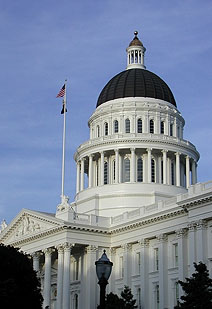One of the initiatives approved by Californians yesterday was Proposition 14, which eliminates separate party primaries. From now on, everyone will compete instead in a single big primary, with the two top vote-getters advancing to the  general election regardless of whether or not they come from different parties. Jesse McKinley of the New York Times explains what happened:
general election regardless of whether or not they come from different parties. Jesse McKinley of the New York Times explains what happened:
Whether the measure will empower more independent voters — who were already allowed to vote in Democratic or Republican primaries, provided they requested a ballot — remains to be seen. But what did seem certain was that California was again poised to capture the mood of the country, just as it did in 1978 with Proposition 13, which distilled widespread antitax sentiment into a cap on property taxes.
This time, it is the anger of the electorate that Californians have bottled, experts said, even if they are not totally sure what they are doing. “I don’t know that people really knew what they were voting for,” said Bruce Cain, director of the University of California Washington Center, based in the District of Columbia.
Mr. Cain said the state of the state — high unemployment, record foreclosures and a palpable anger at legislators — had primed the pump. “When people get mad,” he said, “they lash out.”
Italics mine. Now, this piece is labeled “news analysis,” so a bit of opinion-mongering is OK. But still: where does this stuff come from? Prop 14 was billed as a measure that would produce more moderate candidates. It was endorsed by most of the state’s big newspapers, it was supported by Arnold Schwarzenegger, and it was heavily favored by the state’s business community (which apparently thinks that “moderates” are more likely to be pro-business). It won by the epic margin of 54-46.
So what prompts McKinley to suggest that its passage was the result of voter rage? Aside from the fact that apparently Bruce Cain couldn’t think of anything more substantive to say about it when McKinley called, nothing. It’s just a handy hook because everyone knows — everyone! — that voters these days are enraged, so if something passes that must be the reason.
Well, who knows? Maybe that was the reason. We don’t think much of our politicians, it’s true. But I have to say that I didn’t notice any special rage surrounding the Prop 14 campaign, and I haven’t seen any polls suggesting that Prop 14 won because mobs of frenzied moderates took to the streets. It won because, of the whopping 20% of California’s registered voters that cared enough one way or the other to cast a ballot, a whopping 300,000 more liked the idea than didn’t. That doesn’t sound especially angry to me.













